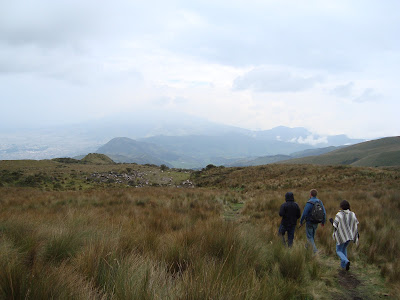Recently, I have been working a lot with the guayusa farmers organization. Here is an update on what I have been up to with the in the last few months.
We have been working with a facilitator, Wain Collen, to help the farmers develop their statutes, internal regulation and communication plan, and help them with budgeting their use of the social premium fund (a fund that the business pays into for each purchase of guayusa that is meant to be used the benefit of the farmers).
In September the group had elections of representatives to the farmers' organization and they requested that a representative of Runa be present at the meetings in order to explain Fair Trade and the social premium fund. It was very interesting to go to the communities to talk to the farmers and also witness their election process.
Listening to a presentation in the community of Atacapi.
Women filling in their secret ballots to elect their representative in San Rafael (the woman second from the right won the election).
The presentation of the new representatives and their alternates in Nukanchicausay and Cotundo (below).
Although from my pictures it may seem that there is a significant number of representatives who are women, this is actually not the case. There are 20 representatives and four are women - many women were elected as alternates. Kichwa women have many responsibilities in the home and often do not speak Spanish as well as the men (most indigenous people in Napo province who live in communities speak Kichwa as their first language). This makes traveling to the town of Archidona for meetings and interacting with Fundación Runa (with mostly Spanish-speaking staff) seem very difficult. The good thing is, as the geographic zonal cooperatives take form, all farmers will have more opportunity to participate as the meetings will be in their zones and will be held in Kichwa.
In October I took a group of the farmers on a trip to visit a cooperative called Jambi Kiwa that produces medicinal plants in the mountain city of Riobamba. The organization was started by an inspiring indigenous woman named Rosa Guaman and is 90% women. They have grown little by little over 25 years and now export their organic and Fair Trade certified medicinal teas and other products to North America and Europe.
Rosa is in the middle in the hat in the photo below:
The Runa farmers also went on a tour of some of the small farms, which are very different from their larger, warmer jungle farms, and exchanged information and ideas with the Jambi Kiwa farmers.
Love,
Aliana




.JPG)















.jpg)


.JPG)
.JPG)

































